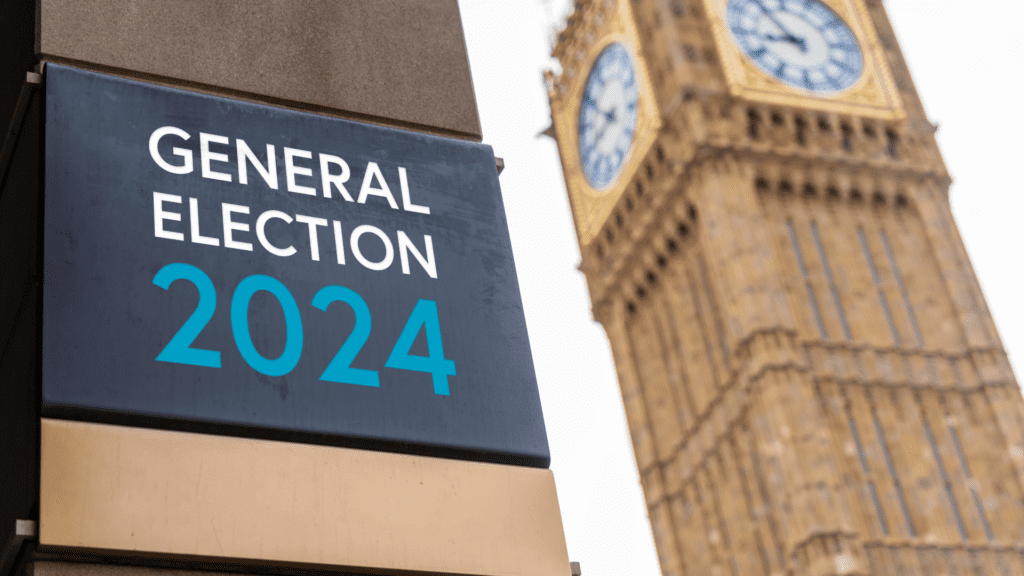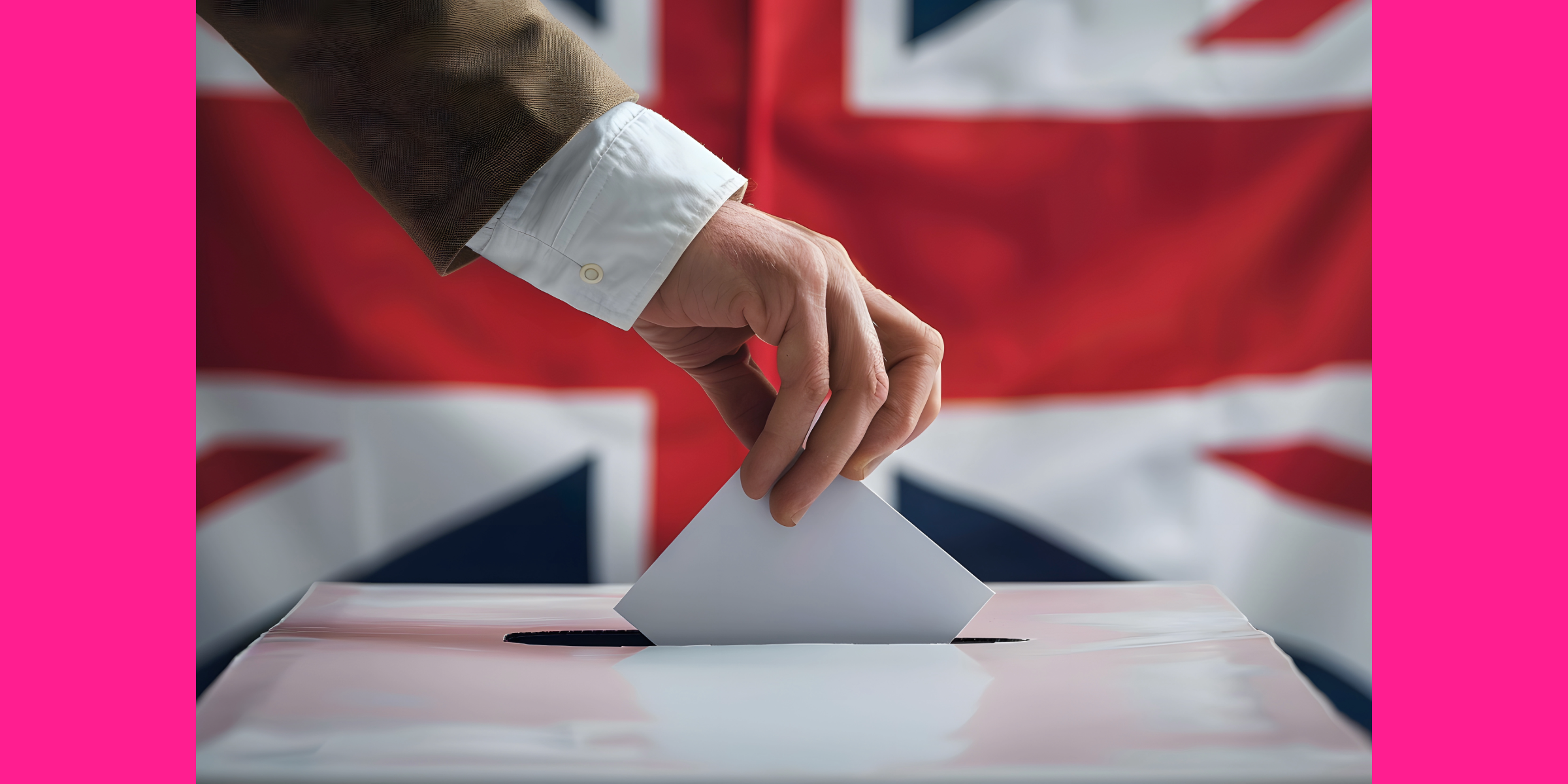We knew it was coming. In fact, the Prime Minister had already confirmed that it was going to happen in the second half of the year. Yet, when rumours of a general election announcement started circulating on social media on the morning of the 22nd May, newsrooms across the country went into a state of high alert.
How it came about
Shortly after 5pm, Rishi Sunak walked out of No 10 to announce, under the pouring rain and among the sound of Labour’s 1997 campaign anthem, that the next general election is going to take place on Thursday 4th of July.
Of course, by the time the lectern was put in place, news channels were already in ‘rolling’ news mode and the BBC, ITV and Channel 4 had changed their evening schedules to allow their presenters and political correspondents to decamp to Downing Street to tell the biggest news of the day.
It’s not like the day was set out to be a ‘slow news’ one. News channels and national programmes had been covering the Post Office inquiry, with former boss Paula Vennells giving evidence for the first time. It was also the seventh anniversary of the Manchester Arena terror attack and Prime Minister’s Questions was taking place at midday. Morning shows were still talking about Craig Mackinlay, the Conservative MP who revealed the night before that he had had his hands and feet amputated due to sepsis.

When a big story breaks
When a general election is announced, it becomes the absolute focus of broadcast news. This is true on air and behind the scenes. After an election is called, the pre-election period (known as ‘purdah’) kicks in. For journalists and producers, this means they need to be extra careful with the PR stories and guests they put on air, even callers need to be screened to ensure they are not standing for election. It can be a stressful period at times. I should know. I was working as a news producer during the 2016 Brexit referendum and the 2017 and 2019 general elections. For the latter, I produced an election night news programme followed by another one on the morning after. It’s the longest I’ve ever gone without sleep.
During the first couple days after an election is announced, political correspondents are deployed to follow the party leaders across the country as they launch their campaigns. It’s also a time when former special advisers, politicians and pollsters get booked to give their thoughts on how the next six weeks are going to pan out. There is also speculation about how many TV debates there will be and broadcasters take to the streets to ‘vox pop’ regular people about how they’re going to vote and the issues they care about.
Big news story fatigue
Big, breaking news are a challenge for PR professionals. When an election is announced, there is a terror attack or someone high profile dies, it’s hard to see how a pre-planned PR story can stay at the top of a news bulletin. Unfortunately, when something like this happens, ‘diary’ or scheduled stories are the first ones to go. On such a day, sometimes the best advice might be to tell a client to drop or postpone a PR news story.
We are, of course, not advocating lying to journalists. But as a former TV and radio producer I can tell you that if the story hasn’t made it to air at all, I would accept it as a new story. As a PR consultant I would, of course, clarify that position if questioned. Honesty is always the best policy!
So, is it a good idea to run a PR campaign during a general election campaign?
Absolutely! And here’s why.
Once election coverage is just one more item in the news agenda, there is an appetite for ‘other’ stories. Politicians and those in the ‘Westminster bubble’ love to follow the campaign to the minute, but the rest of us, not so much. Viewers / listeners will welcome something different, and journalists will be glad to be working on content that has nothing to do with politics. Six weeks can be a long time.
In this context, you may think that the right thing to do is to delay your PR story until after the election, but that is not necessarily the best course of action.
On the one hand, there is a high chance that the first few days after the vote are dominated by the results. If there is a change of government, the focus will be on the new PM, cabinet and policies set out for the first 100 days in power. If the current government stays on, pundits will wonder how the polls got it so wrong. And if there is a hung parliament, the focus will be on potential coalitions and whether any party may be able to form a government at all.
And on the other hand, if you’re thinking about delaying your PR campaign until after the election, so are many others, increasing the amount of potential competition you will face. Just because a lot of people do something, doesn’t make it right!
There will be more competition for airtime over the next few weeks, but there are things you can do to provide all the ingredients a broadcaster will be looking for. Here are some great ways to increase your PR campaign coverage during an election:
- Be an enthusiastic spokesperson with flexible availability. If you’re looking for national coverage, they need to be willing to travel to TV and radio studios, which often means they need to be in London – or Manchester if your goal is to place them on BBC Breakfast.
- Use case studies. Broadcasters love human interest stories because they resonate with the audience. It depends on the story, but if it is appropriate, offering a case study will increase your chances of securing coverage on both news and magazine-style programmes. In the case of TV, they also make for very useful pictures.
- Use pictures. If possible, it is a good idea to offer broadcasters a location where they can film an interview for themselves. You can also offer B-roll, which is about 6-7 minutes of roughly edited footage produced by agencies like Shout! Communications, then distributed free of charge and any copyright issues. Broadcasters then re-edit this footage, sometimes mixing it in with pictures they have shot themselves. Pictures will increase the chances of getting your story on TV. Some broadcasters will go as far as ruling out an item that has no picture because that means they can’t tease it during the opener of a programme.
- Hook your story to the election. Make the most out of the political context by making your story relevant to the PR campaign. Even a loose link can increase your chances of getting more traction.
- Shift the focus to other elements of the media. If national broadcasters are interrupting their usual programming for a debate or to cover a political stunt, it might be a good idea to put the focus on regional radio and TV. Transitioning from national to regional for a PR campaign during an election can often yield better results, as hese audiences won’t be expecting 24/7 election coverage Regional journalists will be keen to keep a balance between politics and other stories.
Getting PR coverage during a general election
When it comes to securing coverage in the midst of a big story, the best example we have was during the pandemic. Then PM Boris Johnson was in intensive care with Covid and the nation was contemplating the possibility that the country’s leader could die in office. We had a story with the Asphalt Industry Alliance about potholes which featured, alongside at least a dozen stations, on Radio 4’s Today programme.
In terms of running a PR campaign during an election, more recently, just days after the election was called and campaigning was in mid flow, we supported OS (Ordnance Survey) with a campaign to mark National Map Reading week, with a story about the perfect walk. The story was picked up by BBC Breakfast and another 17 radio stations.
Need help navigating the waters?
All is possible when it comes to securing broadcast coverage for PR stories during the election campaign – or indeed the next big story that breaks. But if you feel you need that extra level of support do get in touch. You can speak to a member of our media relations team by calling 020 7240 7373 or email hello@shoutcommunications.co.uk.




